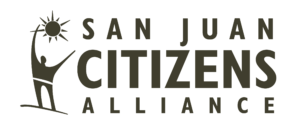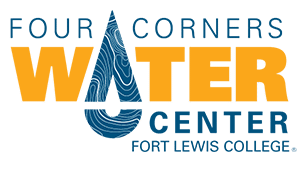
UNHEALTHY STREAM AND MEADOW

HEALTHY STREAM AND MEADOW
This workshop will focus on how and why restoring degraded headwater streams
provides greater resilience to drought, wildfires and flooding among other benefits.





San Juan Citizens Alliance, Give a Dam, the Colorado Healthy Headwaters Working Group, Mountain Studies Institute, the Four Corners Water Center, and Dolores River Anglers Trout Unlimited are excited to invite you to attend a free workshop, Philosophy, Tools, and Tales of Success for Re-Building Resilient Rivers in Southwestern Colorado, from September 22nd – 23rd, 2023 at Fort Lewis College in Durango.
Workshop Organizer Leads:
Sara Burch, San Juan Citizens Alliance, Nichole Fox, Executive Director of Give a Dam, and Jackie Corday, Co-Chair of the Colorado Healthy Headwaters Working Group (HHWG).
Other Key Advisors and Sponsors:
The Fort Lewis College Four Corners Water Center, Mountain Studies Institute, Trout Unlimited Dolores River Anglers Chapter (DRA), and Steve Monroe (former National Parks Service Hydrologist for Mesa Verde National Park).
Resources:
Great Summary of LTPBR White Paper American Rivers
Signed Copy of SB23-270 Projects to Restore Natural Stream Systems
Goals and Focus of the Workshop
- Participants will have a better understanding of the scope of riverscape degradation in SW Basins and how low-tech process-based restoration (LTPBR) can be a highly effective low-cost strategy to restore riverscape health at the scale needed to address problems the SW faces with increasing drought, wildfires, and sedimentation of our streams and water infrastructure.
- Participants will have a better understanding of the challenges of planning and implementing LTPBR and how to address those challenges.
- Provide the opportunity for networking and dialogue between land and water management agencies and organizations to help generate collaborative efforts to restore streams in the SW Basin.
- Connect agencies and organizations that are interested in cross-collaboration on fuels reduction and stream/wetlands restoration – watershed scale projects that do both.
Draft Agenda
Day 1 - September 22nd, 2023
- 8:30 – 8:45 – Introduction: workshop overview, acknowledgement of sponsors and partners.
- Sara Burch, San Juan Citizens Alliance, and Melissa May, Mountain Studies Institute Executive Director
- 8:45 – 9:15 – Overview of Southwestern CO Riverscapes – What have we lost? What can we address with restoration?
- Catherine Ortega, SW Wetlands Focus Committee Chair, and Alan Kasprak, Assistant Professor of Geosciences Fort Lewis College.
- This section will address: 1) What are the processes, functions, and ecosystem services of a riverscape? The history of the major disturbances that have led to degraded waterways in SW basins (e.g., beaver eradication, grazing, development, water delivery infrastructure); 2) An overview of process-based restoration principles and approaches that are relevant to addressing these issues. Participants will gain an understanding of the compounding issues that have led to the loss of riverscape function, and why those functions are critical to restore.
- 9:15 – 9:45 – State of the Science – A summary of research on the ecosystem services effects of successful LTPBR projects.
- Jackie Corday, Corday Natural Resources Consulting
- This section will review the highlights of a comprehensive report that synthesizes the published and unpublished case studies of the effects of restoring streams with low-tech PBR and beaver-related restoration, including the benefits observed to surface and groundwater, water quality, improved resilience to climate impacts, and improved aquatic and terrestrial habitat. With 1000s of miles of streams that require restoration efforts, low-cost scalable methods are needed. The research indicates that LTPBR is one of the most effective low-cost tools to restore stream health and improve critical ecosystem services.
- 9:45 – 10:00 – Q/A session between speakers and participants.
- 10:00 – 10:20 Break
10:20 – 12:00 – Current Challenges for Riverscape Restoration in SW Basins. Discusses the barriers, constraints, what to consider for PBR project planning, and how to collectively work through challenges. 20 minutes for each topic below to review some of the most significant challenges to LTPBR restoration work.
- 10:20 – 10:40 – Water rights issues – Information on what typical concerns may be and how to address them in addition to review of SB270.
- Jackie Corday, Corday Natural Resources Consulting
- 10:40 – 11:00 – USACE Permitting Process – How to navigate the permitting process for different land management agencies & ownership.
- Kara Hellige, Chief, Southern Colorado Branch of USACE
- 11:00 – 11:20 – Social Issues with Beaver – most LTPBR projects will have the goal of restoring streams in historic beaver habitat with the intent of assisting beaver recolonization for long-term maintenance of stream health. Thus, projects must take into account and plan for avoiding or addressing potential conflicts (e.g. preventing culverts from being plugged and roads flooded).
- Nichole Fox, Give a Dam Executive Director
- 11:20 – 11:40 – Capacity Funding for Planning & Implementing Projects – an overview of some of the best opportunities for state and federal funding. A couple grants are now available to address “lack of capacity” to plan for projects and several sources are available for implementing projects.
- Alex Funk, Director of Water Resources and Senior Counsel at Theodore Roosevelt Conservation Partnership.
- 11:40 – 12:00 – Q/A session between speakers and participants.
12:00 – 1:00 Lunch Break. RSVP for access to the free lunch buffet!
- 12:30 – 1:00 – Keynote Speaker – Conserving and restoring riparian, fisheries, and water resources in a changing climate – a five-year strategy for the BLM’s aquatic resources program.
- Ed Rumbold, BLM Hydrologist/Aquatic Resources Program Lead
- 1:00 – 1:30 – Taking a Watershed Approach to LTPBR Project Planning – How to identify and where to begin?
- Shawn Conner, Restoration Ecologist with BIO-Logic, Inc.
- Process based restoration techniques take on a variety of treatment forms and are specific to site potential and differing restoration goals. In this presentation, Shawn will provide an overview of watershed scale process-based restoration techniques and how practitioners can begin to identify project area and prioritize treatments.
1:30 – 3:00 – Stories of Success and Lessons Learned. Speaker Presentations on LTPBR Application Throughout the State.
- 1:30 – 2:00 – Taylor Park Wetland Restoration Project: Trail Creek
- Eli Smith, Stewardship Director with High Country Conservation Advocates, and Adde Sharp, Colorado River Watershed Project Coordinator with the National Forest Foundation.
- This presentation will showcase the highly successful collaboration between their organizations, the USFS, and many other partners to plan, fund, and implement a multi-year LTPBR project in the Upper Gunnison Basin. This project quickly welcomed community volunteers who helped implement beaver mimicry structures, involvement from academic institutions, and a pair of local beavers.
- 2:00 – 2:30 – Rio Grande National Forest – Wet Meadows Restoration Project
- Jason Remshardt, Fisheries and Wildlife Program Manager RGNF, and Connor Born, Stewardship Coordinator with Rio Grande Headwaters Restoration Project
- Talk will discuss installation of beaver dam analog (BDA) sites focused on areas that would improve native fish habitat, methods used for project monitoring, and a brief overview of beaver relocation efforts on the Rio Grande National Forest.
- 2:30 – 3:00 – Wildcat Stream Enhancement Project: What & Why? – Log pour-over structures for distributed and resilient trout refuge
- Raymond Rose, Dolores River Anglers Trout Unlimited Chapter.
- Talk will highlight ongoing efforts of installing log pour-over structures that capitalize on seasonal high flows to generate and maintain distributed and resilient refuge for trout amid declining stream flows within the Upper Dolores River watershed.
3:00 – 3:15 –Afternoon Q/A session between speakers and participants. Venue is reserved until 3:30.
3:30 – Whenever! – Join us for an opportunity to connect and converse in the heart of Downtown Durango. This networking session will be held at 11th Street Station (1101 Main Ave Durango, CO 81301). We look forward to seeing you there!
Day 2 - September 23rd, 2023
A half-day field trip (8 am – 1 pm) to the Mesa Verde NPS stream restoration site within the Mancos River watershed. Lunch not provided, and carpooling from Durango to Mancos, CO is required. RSVP for the field trip is full. Please email sara@sanjuancitizens.org to sign up for the waitlist.
